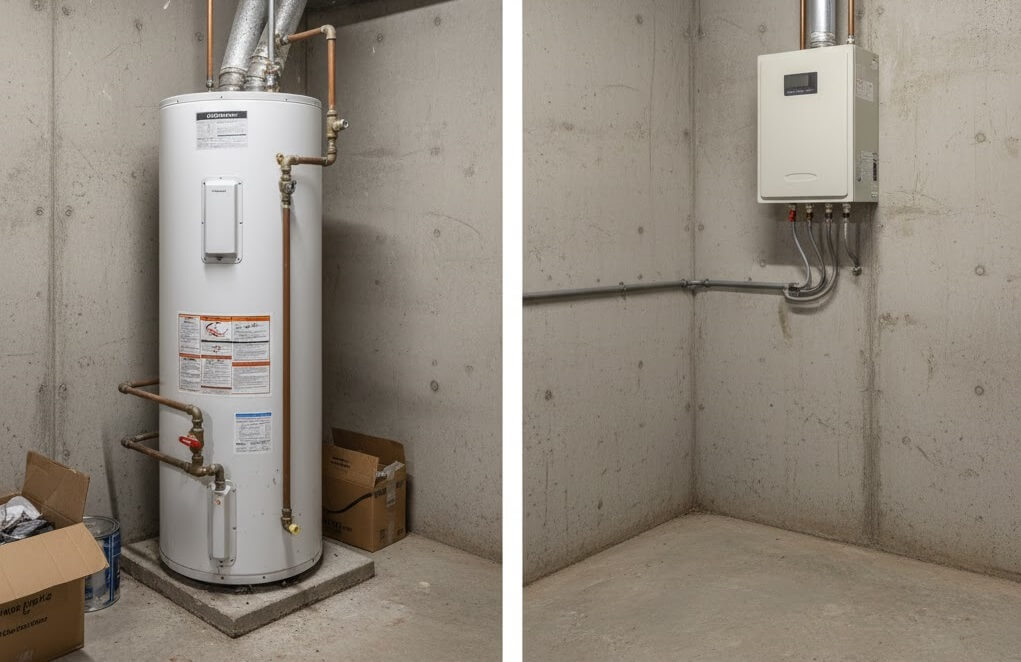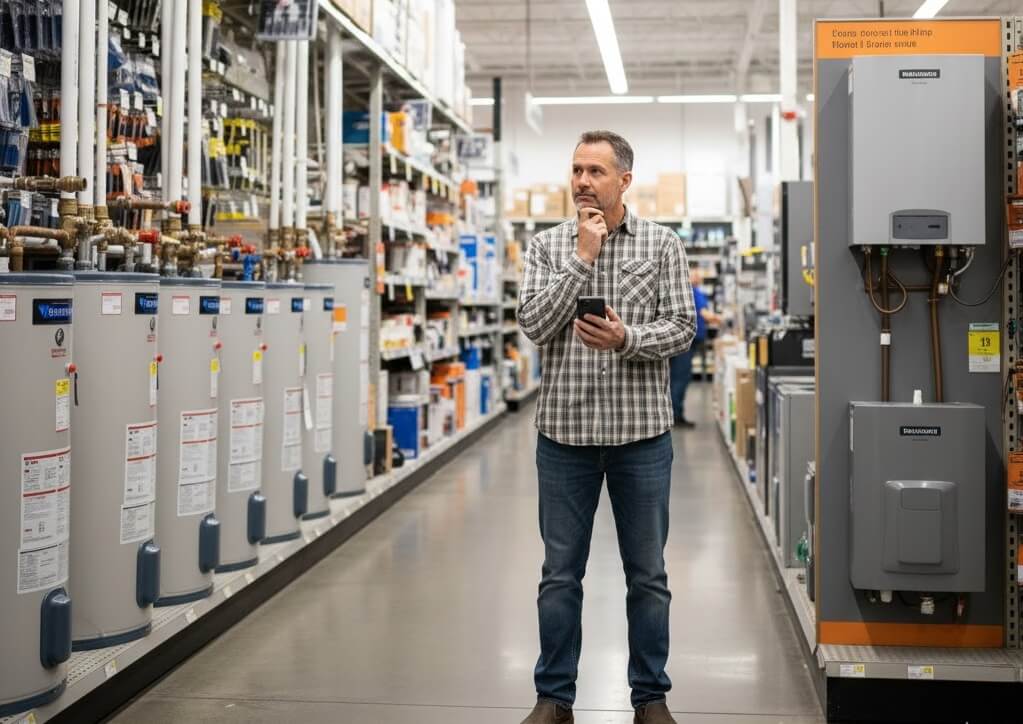For homeowners in Etobicoke, making decisions about major appliances often comes down to balancing immediate cost with long-term energy efficiency and reliability. Few home systems are as critical—or as frequently debated—as the water heater. The choice between a modern tankless water heater and a familiar traditional water heater can significantly impact your utility bills, available space, and access to hot water. This comprehensive guide provides an in-depth comparison to help you determine the optimal solution for your specific property and lifestyle in the Greater Toronto Area. We’ll explore the pros and cons of each system, examining key factors like installation, ongoing maintenance, and overall lifecycle value, ensuring you have all the facts before investing in the comfort of your home.
Understanding Traditional Water Heaters
The traditional water heater, often referred to as a storage-tank water heater, is the most common type found in homes across Etobicoke and North America. Its operation is straightforward, and its design has been a reliable fixture for decades.
How They Work
A traditional water heater consists of a large, insulated storage tank, typically ranging from 40 to 60 gallons for residential use. This tank constantly holds a reserve of hot water. When a faucet is turned on, hot water is drawn from the top of the tank, and cold water enters the bottom to replace it. A thermostat regulates the water temperature, and a gas burner or electric heating elements switch on periodically to reheat the stored water. This constant heating and reheating process, even when no hot water is being used, is a defining characteristic of the system.
Advantages and Disadvantages
The main advantages of a traditional water heater include its lower initial cost and simple installation. It uses reliable, simple technology that is easy for most plumbers to service, and it provides high flow rates suitable for multiple simultaneous uses.
However, the key disadvantages revolve around its limited supply and poor energy efficiency. It suffers from significant energy loss due to “standby heat loss” and, once the tank is empty, you must wait for it to reheat. Its large size requires considerable basement or utility room space, and it has a shorter lifespan, typically 10-15 years.
Exploring Tankless Water Heaters
The tankless water heater, also known as an on-demand water heater, represents a significant technological leap in home water heating. It has become increasingly popular in Etobicoke as homeowners seek greener, more efficient solutions.
How They Work
A tankless water heater doesn’t store water. Instead, it heats water instantaneously as it flows through the unit. When a hot water tap is opened, cold water travels through a pipe into the unit. A flow sensor detects the demand and activates a powerful gas burner or electric heating element. This heat exchanger quickly raises the water to the desired temperature before sending it on its way to the faucet. When the tap is closed, the unit shuts off. Because it only heats water when it’s needed, it is a champion of energy efficiency. You can read more about the installation process for tankless water heaters here.
Advantages and Disadvantages
The clear advantages of a tankless water heater are the provision of an endless supply of hot water and superior energy efficiency (up to 34% more efficient than tank models). They have a compact size that saves valuable floor space and a longer lifespan, often exceeding 20 years. They may also be eligible for some rebates and incentives.
Conversely, the primary disadvantages are the higher initial purchase and installation cost, especially for gas models requiring new venting. There is also a potential for flow rate limitations if multiple fixtures are demanding hot water simultaneously, and they require specialized annual maintenance (descaling/flushing).

Key Differences Between Tankless and Traditional Water Heaters
When performing a direct comparison, several critical factors emerge that highlight the fundamental differences between these two heating systems, each bearing specific relevance to a property in Etobicoke.
Energy Efficiency
This is arguably the most significant differentiator. Traditional water heaters suffer from standby heat loss—the energy wasted as the tank continually heats the water, regardless of demand. This accounts for a substantial amount of wasted cost over the unit’s life. Tankless water heaters eliminate standby loss entirely because they do not store hot water. According to Energy Star, a tankless unit can be 24%–34% more energy efficient than a conventional storage-tank heater for homes that use 41 gallons or less of hot water daily. Over the lifespan of the unit, this difference translates to considerable savings on your Etobicoke utility bills.
Cost
The cost comparison reveals a trade-off between upfront investment and long-term savings. The initial purchase and installation of a tankless water heater can be two to three times higher than a traditional water heater. A large part of this higher price is often due to necessary venting and gas line upgrades, particularly in older Etobicoke homes. However, the superior energy efficiency of the tankless water heater means lower monthly operating costs.
When factoring in the longer lifespan (20+ years for tankless vs. 10-15 years for traditional), the higher initial investment for a tankless water heater is typically offset by energy savings, making the Total Cost of Ownership (TCO) often lower for the tankless option over two decades.
Space Requirements
For homes in Etobicoke where space is at a premium, the spatial difference is a major advantage for the tankless option. A traditional water heater is a bulky appliance, often taking up significant floor space in a basement or utility closet. A tankless water heater is a small, wall-mounted unit, roughly the size of a suitcase, freeing up valuable real estate. This compact size allows for flexible installation, sometimes even in a garage or utility room, which is a massive pro for maximizing living space.
Lifespan
Durability and longevity significantly impact the total number of replacement cycles an Etobicoke homeowner can expect. A traditional water heater typically has a lifespan of 10 to 15 years before tank corrosion necessitates replacement. Because a tankless water heater is built with replaceable parts and is not subject to the corrosive environment of storing water, its lifespan can easily exceed 20 years, provided it receives regular maintenance. This longer lifespan is another factor contributing to its eventual economic advantage.
Factors to Consider When Choosing a Water Heater for Your Etobicoke Home
Selecting the right water heater involves more than just a direct feature-to-feature comparison; it requires evaluating your household’s specific needs and the characteristics of your Etobicoke property.
Household Size and Usage: Large families or homes with high simultaneous hot water demand (e.g., running a shower, washing machine, and dishwasher at once) may need a high-capacity gas tankless water heater or require two smaller tankless units to meet peak flow rate needs. A small family or couple may find a high-efficiency traditional water heater sufficient and more cost-effective upfront.
Fuel Source Availability: While electric tankless heaters exist, the most powerful and efficient units run on natural gas or propane. Most Etobicoke homes have natural gas lines, making a gas-powered tankless water heater a viable and high-performing option. If only electricity is available, a high-efficiency heat pump water heater (a type of traditional unit) may offer a better comparison for efficiency.
Budget for Installation: If your budget is tight, the lower initial cost of a traditional water heater will be a deciding factor. If you have the capital for the higher upfront installation cost, the tankless water heater is the superior long-term investment due to its exceptional energy efficiency.
Installation and Maintenance
Regardless of which system you choose, proper installation and ongoing maintenance are essential for optimal performance and longevity, especially given the seasonal demands placed on heating systems in Etobicoke.
Installation:
Traditional: Installation is relatively straightforward, often involving a direct replacement. Cost is lower, and the job is generally quicker.
Tankless: Installation is more complex and involves a higher cost. Gas units often require wider venting pipes (stainless steel) and a larger gas line to handle the higher BTU demand. Electric units require dedicated, high-amperage wiring. Due to this complexity, it is crucial to hire a licensed and experienced professional.
Maintenance:
Traditional: Requires minimal routine maintenance. Homeowners should occasionally check the pressure relief valve, but service is usually only needed when a component fails.
Tankless: Requires annual flushing or descaling to remove mineral buildup (limescale) from the heat exchanger, especially in areas with hard water. While this is an additional annual cost and task, it is vital to protect the unit’s energy efficiency and ensure its extended lifespan.
Get Expert Water Heater Advice in Etobicoke
For reliable water heater services, including expert guidance on the right unit for your needs and professional installation and maintenance in the Etobicoke area, you should consult us at D. Jason Plumbing, who specialize in both tankless water heater and traditional water heater systems.
